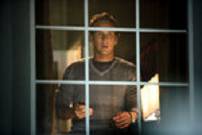|
|
||||
|
|
by John P. McCarthy  Neil LaBute's race drama ignites fear and loathing in suburban Los Angeles by pitting an African-American cop against his mixed-race neighbors. On balance, Lakeview Terrace may amount to a cynical vehicle for exploiting troubling social issues, but it has more substance than you'd imagine from watching the trailer. Samuel L. Jackson brings Luciferian charm to the role of Abel Turner, a veteran patrol officer with the LAPD, and LaBute pushes buttons with his usual gusto, delighting in the chance to create an incendiary thriller. The playwright and filmmaker's reputation for provocation precedes him, most notably on the subject of male-female power struggles such as in his debut movie In the Company of Men and 2002's The Shape of Things. While the screenplay of Lakeview Terrace is credited to David Loughery and Howard Korder (from a story by Loughery), the reactionary way race is dealt with and the effectiveness of the intimate moments and conversational exchanges give it the hallmarks of a LaBute piece. Considering the plot trajectory, it's a pretty complicated examination of race, more akin to a caustic T.C. Boyle short story than the typical Hollywood thriller scenario it masquerades as and may ultimately amount to. Southern California's dry terrain is literally a tinderbox, but when the movie smoke clears, the conflagration has raged mostly inside the heads of the filmmakers and their disturbed protagonist. In the end, Abel is a monster in whom we see something of ourselves, which is why we don't want to look and are more inclined to dismiss his behavior as implausible and overwrought. Patrick Wilson and Kerry Washington play Chris and Lisa Mattson, the handsome interracial couple -- poster children for miscegenation -- who move in next door to Abel and whose marriage is tested by his hostile behavior and escalating pattern of harassment. The Mattson's are liberal, Saab and Prius-driving yuppies from the Bay area. Chris, who is white, attended Berkeley on a lacrosse scholarship, listens to rap, smokes herbal cigarettes on the sly, and is an executive for an organic supermarket chain. Lisa is an African-American designer anxious to start her own family. Her well-heeled father has never embraced Chris and is concerned for his daughter’s safety. He has reason to worry. A stern single dad raising two kids far from the South Central neighborhood where he grew up, Abel is a homemaker, enforcer and avenger. He takes a traditional approach to his job and his family; his modus operandi in both spheres is equal parts wily and belligerent. In a tense sequence that takes place while he's on patrol, Abel brutally disarms an African-American male who is holding his wife and child hostage, admonishing him to live up to his responsibilities as a black man. The personal motive eventually revealed for Abel's behavior toward the Mattson's is far from exculpatory but does engender a little sympathy. Above all, the film forces us to consider his actions within a much larger context. The feud he sets in motion trades on crude stereotypes that are still in play unfortunately. There's a strong sexual component, not least because the Mattson's first transgression is having sex in their pool in clear view of Abel's fifteen-year-old girl and pre-teen boy. Abel questions Chris' manhood while pressing buttons marked white guilt. Chris complains about the guff he's always getting from black guys for marrying a black woman, and Lisa thinks it clouds his judgment and that he'll wear kid gloves when confronting Abel. As their disagreement escalates and brushfires threaten the neighborhood, the melting pot that is Southern California boils over into the semi-apocalyptic. Abel ends up in a cruciform position, which suggests the character has some redemptive quality, at least as an anti-hero. Lakeview Terrace doesn't offer a flattering portrait of the African-American male suburbanite, but LaBute and company would presumably argue that the character of Abel Turner is not intended to be emblematic. And they succeed in making him particular. If he weren't unhinged, they could be accused of buying into the racist premise that inter-racial marriage is morally wrong. The idea that Abel is a nut job and yet still able to teach us something about race relations and moving beyond skin color may be the most incendiary aspect of the movie. (Released by Screen Gems and rated "PG-13" for intense thematic material, violence, sexuality, language and some drug references.) |
||
|
© 2024 - ReelTalk Movie Reviews Website designed by Dot Pitch Studios, LLC |



